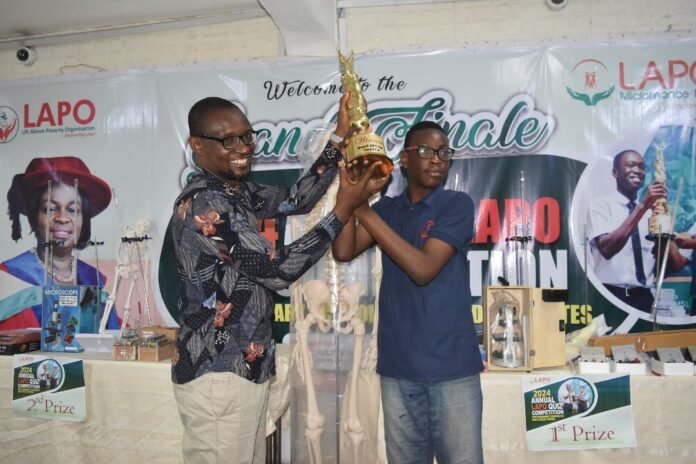First Class Private Academy of Warri, Delta State, scored 70 points to emerge as the champions of the 2024 Annual LAPO Secondary School Quiz Competition.
The competition, organized annually by the Lift Above Poverty Organisation (LAPO) and sponsored by LAPO Microfinance Bank (MfB), was held on Friday at the LAPO Institute for Microfinance and Management Studies, Benin City.
Peniel Academy, Boji-Boji Owa, Delta State, finished second with 65 points, while Pioneer Education Centre, Benin City, claimed third place with 55 points.
In fourth place, Graceville College, Asaba, Delta State, scored 35 points. Don Bosco Science Academy, Ukhu, Ekpoma, Edo State, secured fifth position with 40 points, while Lumen Christi International High School, Uromi, Edo State, finished sixth with 25 points.
Speaking at the event, the Managing Director of LAPO Microfinance Bank, Cynthia Ikponmwosa, highlighted that more than 225 public and private secondary schools from Edo and Delta States participated in the quiz competition.
She stated that the competition aligns with the bank’s philosophy of promoting literacy, educational empowerment, and the transformational power of knowledge.
She added, “Today, we are not only celebrating the achievements of these bright students but also reinforcing our belief that literacy is a fundamental pillar in creating a prosperous, resilient society.
“At LAPO Microfinance Bank, we see literacy as the foundation upon which sustainable development rests. Education opens doors to opportunities, dismantles barriers, and ultimately empowers individuals to lift themselves and their communities out of poverty.
“By promoting literacy and academic excellence, we aim to create a ripple effect of positive change, instilling skills, confidence, and vision in the next generation. It is with this vision that LAPO established this quiz competition in 2006, to stimulate curiosity, intellectual rigor, and a passion for lifelong learning among students in Edo and Delta States.”
Executive Director of LAPO, Ayo Obadiora, explained that challenges faced by the Nigerian education sector including limited funding, inadequate infrastructure, a shortage of qualified teachers, and insufficient oversight led to the establishment of the quiz competition.


